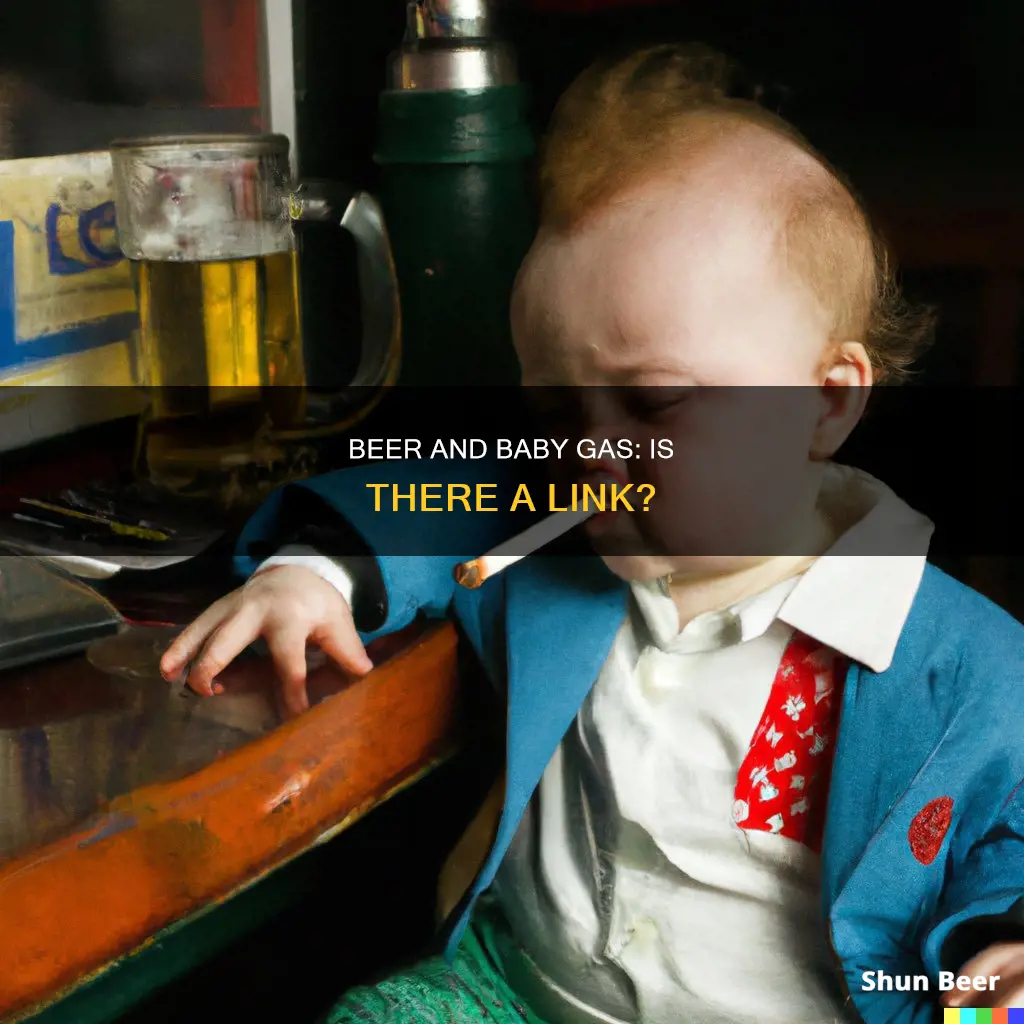
Drinking beer can cause bloating and excess gas in adults, but can it have the same effect on a baby in the womb? Beer contains carbon dioxide, which is released in the stomach and can lead to bloating and flatulence. While there is limited scientific research on the impact of a mother's diet on breastfed babies, some mothers have reported that their babies become gassy after consuming certain foods, such as beans, onions, and garlic. However, it is important to note that most babies tolerate the food consumed by their mothers, and intestinal gas is not harmful.
| Characteristics | Values |
|---|---|
| Can drinking beer give you a gassy baby? | Drinking beer releases carbon dioxide gas which builds up in your gut and can cause bloating and excess gas. |
| How to reduce bloating from drinking beer | Drink water before, during, and after consuming beer. |
| How long does alcohol stay in breast milk? | Alcohol stays in breast milk for a few hours after consumption and falls as the level of alcohol in the bloodstream falls. |
| How long to wait to breastfeed after drinking beer | The NHS advises waiting 2-3 hours per drink before breastfeeding to avoid exposing your baby to alcohol. |
What You'll Learn

Beer consumed by breastfeeding mothers can pass to breast milk
The alcohol level in breast milk closely parallels the alcohol level in the mother's bloodstream. Typically, alcohol levels in breast milk are highest 30 to 60 minutes after consuming an alcoholic beverage. However, food delays the time it takes to reach peak alcohol levels in the milk. The more alcohol consumed, the longer it can be detected in the breast milk. For example, alcohol from one drink can be detected in breast milk for about two to three hours, while alcohol from three drinks can be detected for about six to eight hours.
Consuming alcohol above moderate levels can interfere with the milk ejection reflex and decrease milk production. It can also negatively impact the infant's development, growth, and sleep patterns. Additionally, it may impair the mother's judgment and ability to care for her child safely.
If a breastfeeding mother chooses to drink alcohol, it is recommended to breastfeed immediately before consuming an alcoholic beverage or to pump and save milk beforehand. It is also advised to limit alcohol intake to one to two beers and wait at least two hours before breastfeeding. If the baby needs to be fed before the two hours are up, previously expressed milk can be used.
Beer and Anxiety Medication: Safe Mix?
You may want to see also

Alcohol in breast milk can affect babies' feeding
Alcohol consumed by a breastfeeding mother can pass into her breast milk and subsequently be transferred to the baby during feeding. While an occasional drink is unlikely to harm the baby, especially if feeding is avoided for at least two hours after drinking, regular drinking above the recommended limits can be harmful to both mother and baby. Excessive alcohol consumption can decrease milk supply and cause sleep, growth, and developmental problems in the baby.
The amount of alcohol in breast milk closely parallels blood alcohol levels, with the highest levels occurring 30 to 60 minutes after drinking. However, consuming food before drinking alcohol can delay the peak milk alcohol levels. Nursing after one or two drinks can decrease the infant's milk intake by 20 to 23% and cause infant agitation and poor sleep patterns. Additionally, infants exposed to significant amounts of alcohol through breast milk experience disruptions in their sleep patterns and reduced activity during their waking hours.
To minimize the risks associated with alcohol consumption while breastfeeding, it is recommended to limit alcohol intake to one or two drinks and ensure a gap of at least two hours between drinking and breastfeeding. It is also important to avoid bed-sharing with the baby if alcohol has been consumed, as this has been associated with sudden infant death syndrome (SIDS).
The effects of alcohol on the baby are directly related to the amount consumed, and the more alcohol consumed, the longer it takes to clear the body. Therefore, it is crucial for breastfeeding mothers to moderate their alcohol intake and prioritize the health and well-being of their babies.
Beer and Hepatitis B: What You Need to Know
You may want to see also

Babies can have temporary intolerance to dairy from their mother's diet
Babies can have a temporary intolerance to dairy from their mother's diet. This is different from a true allergy to cow's milk but is instead a sensitivity to cow's milk protein. This sensitivity can cause tummy troubles such as fussiness, spit-up, or green stools with mucus and small flecks of blood. Babies with this sensitivity will also have difficulties digesting soy protein.
Cow's milk protein sensitivity and lactose intolerance are not the same thing, but they can sometimes occur at the same time since food allergies can cause secondary lactose intolerance. If your baby is sensitive to dairy in your diet, it will not help to switch to lactose-free dairy products. The problem is the cow's milk proteins, not the lactose. Cooking dairy products may reduce but will not eliminate the allergens.
If you think your baby is reacting to a particular food, then eliminate that food from your diet for 2-3 weeks to see if your baby's symptoms improve. If your baby's symptoms do improve, then this food may be a problem for your baby. Eliminating a food for less than 2-3 weeks may not be effective—cow's milk protein, for example, can persist in a mother's body for 1.5–2 weeks, and it may be another 1.5–2 weeks before the protein is out of the baby's system.
If your baby is highly allergic, it will be necessary to eliminate all sources of dairy proteins, which requires a careful reading of food labels. Many dairy-sensitive babies outgrow their sensitivity by 6-18 months, and most outgrow it by 3 years.
Beer Drinking: Is Three-a-Night Habit Bad for Health?
You may want to see also

Carbonated drinks may or may not cause gassiness in babies
Carbonated drinks, including beer, release carbon dioxide gas, which can build up in the stomach and lead to bloating and excess gas. This is because the gas released from the drink needs to escape the body and often does so through the sin socket, leading to flatulence. Additionally, the complex sugars and live yeast found in heavy or complex beers can further contribute to flatulence as they are more difficult for the digestive system to process.
However, it is important to note that the effect of carbonated drinks on gassiness may vary from person to person. For example, some individuals may be sensitive to bubbly drinks, while others may not experience any noticeable difference in their gas levels.
Furthermore, when it comes to breastfeeding, it is recommended to avoid alcohol altogether as it can pass into breast milk and have harmful effects on the baby's development. However, if a breastfeeding mother chooses to have an occasional drink, it is advised to wait for at least two to three hours per drink before breastfeeding to minimise the baby's exposure to alcohol.
In conclusion, while carbonated drinks may contribute to gassiness in adults, the effect on babies is less clear and may vary from individual to individual. To ensure the safety of the baby, it is always recommended to consult with a healthcare professional for personalised advice.
Chewing and Drinking: Pancreatitis Risks with Beer and Tobacco
You may want to see also

Alcohol is a dangerous poison for children
Drinking beer can indeed cause gas in adults and babies alike. Beer contains sulfate, which makes farts smellier, and carbon dioxide, which builds up in the gut and leads to bloating and excess gas.
Alcohol is a central nervous system depressant and can cause low blood sugar (glucose) in children. Even small amounts of alcohol can be harmful to children, as their bodies cannot tolerate it like adults. Alcohol is quickly absorbed into the bloodstream from the stomach, and it can cause seizures, comas, and even death in children. It is essential to keep alcoholic beverages and products containing alcohol, such as mouthwash and hand sanitizer, out of the reach of children. If a child consumes alcohol, it is crucial to act quickly and contact Poison Control for guidance and assistance.
Kids and NA Beer: What Parents Should Know
You may want to see also
Frequently asked questions
Yes, drinking beer can give your baby gas. Alcohol passes to your breast milk, and any foods containing cow milk protein are the most commonly reported food substance to cause gas in infants.
Signs of baby gas include frequent crying and fussiness, trouble eating and/or sleeping, pulling the legs up after feedings, and seeming uncomfortable or in pain, especially during or after feedings.
There are several things you can do to relieve your baby's gas, including bicycling their legs, burping them at least twice during feedings, infant gas drops, gripe water, and tummy time.
While most babies tolerate the food consumed by their mothers, some foods that may cause gas in infants include kale, spinach, beans, onions, garlic, peppers, spicy foods, and dairy products.
Yes, drinking alcohol can affect your breastfeeding. Alcohol can disrupt the hormone that controls the 'let-down' of breast milk, and babies take around 20% less milk per feed in the three to four hours after alcohol is consumed.







